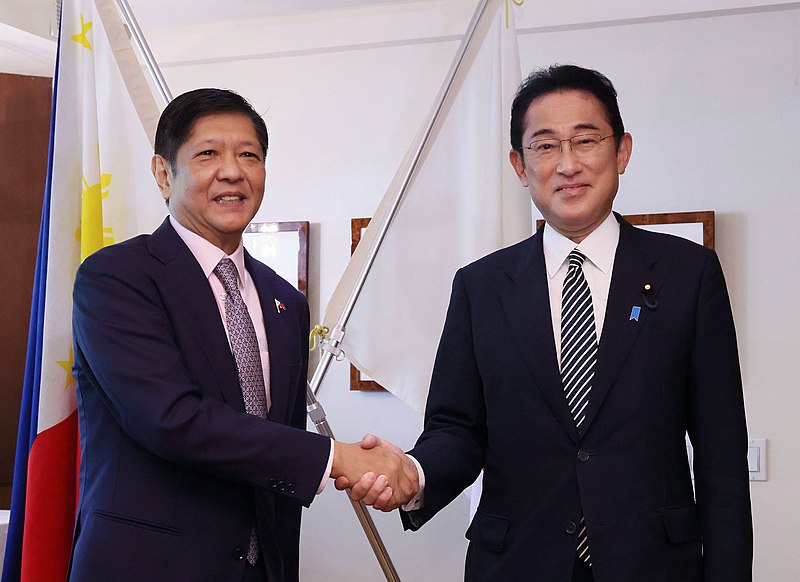Japan and the Philippines pledged to strengthen security ties amid shared concerns regarding China and tensions in the region. Both countries also signed an agreement that would allow their armed forces to work together on disaster relief efforts.
On Thursday, Japanese Prime Minister Fumio Kishida and Philippine President Ferdinand Marcos Jr. had a bilateral meeting in Tokyo, where both leaders pledged closer security ties and signed an agreement allowing the armed forces of both countries to work together on disaster relief operations. The agreement is seen as a step towards a broader deal that would allow Japan and the Philippines to deploy each other’s respective forces on each other’s territories.
“In this year of complex international situations, Japan attaches great importance to cooperation with the Philippines,” said Kishida in his opening remarks during his meeting with Marcos. Both leaders later agreed on establishing a framework that would “strengthen and smooth the process of holding joint exercises.”
The most recent joint exercise Japan held with the Philippines was with the United States back in October. The disaster relief agreement is believed to be a possible prerequisite to establishing a visiting forces agreement that would allow Japan to deploy its forces to the Philippines easily. Tokyo already has such agreements with Australia and the United Kingdom.
A Japanese military presence in the Philippines would also help counter Chinese influence in the region, especially in the South China Sea, which Bejing claims control over the majority of the waters. China’s claims drew the ire of surrounding nations that have overlapping claims, including Manila.
“After our meeting, I can confidently say that our strategic partnership is stronger than ever as we navigate together the rough waters buffeting our region,” said Marcos, adding that he agreed to cooperate more closely with Japan on matters including defense cooperation and maritime security.
Earlier this week, the head of the Philippine coast guard said it has ramped up its presence in the waters by deploying more vessels while conducting more patrols to better protect the country’s maritime territory and its fishermen. PCG Commandant Admiral Artemio Abu said in an interview that the PCG acquisition of more advanced ships has allowed the coast guard to increase the number and duration of patrols in the South China Sea.



 Trump Allows Commercial Fishing in Protected New England Waters
Trump Allows Commercial Fishing in Protected New England Waters  South Korea Assures U.S. on Trade Deal Commitments Amid Tariff Concerns
South Korea Assures U.S. on Trade Deal Commitments Amid Tariff Concerns  Trump Signs “America First Arms Transfer Strategy” to Prioritize U.S. Weapons Sales
Trump Signs “America First Arms Transfer Strategy” to Prioritize U.S. Weapons Sales  Japan Election 2026: Sanae Takaichi Poised for Landslide Win Despite Record Snowfall
Japan Election 2026: Sanae Takaichi Poised for Landslide Win Despite Record Snowfall  Missouri Judge Dismisses Lawsuit Challenging Starbucks’ Diversity and Inclusion Policies
Missouri Judge Dismisses Lawsuit Challenging Starbucks’ Diversity and Inclusion Policies  US Pushes Ukraine-Russia Peace Talks Before Summer Amid Escalating Attacks
US Pushes Ukraine-Russia Peace Talks Before Summer Amid Escalating Attacks  TrumpRx Website Launches to Offer Discounted Prescription Drugs for Cash-Paying Americans
TrumpRx Website Launches to Offer Discounted Prescription Drugs for Cash-Paying Americans  Nighttime Shelling Causes Serious Damage in Russia’s Belgorod Region Near Ukraine Border
Nighttime Shelling Causes Serious Damage in Russia’s Belgorod Region Near Ukraine Border  Ohio Man Indicted for Alleged Threat Against Vice President JD Vance, Faces Additional Federal Charges
Ohio Man Indicted for Alleged Threat Against Vice President JD Vance, Faces Additional Federal Charges  Iran–U.S. Nuclear Talks in Oman Face Major Hurdles Amid Rising Regional Tensions
Iran–U.S. Nuclear Talks in Oman Face Major Hurdles Amid Rising Regional Tensions  Norway Opens Corruption Probe Into Former PM and Nobel Committee Chair Thorbjoern Jagland Over Epstein Links
Norway Opens Corruption Probe Into Former PM and Nobel Committee Chair Thorbjoern Jagland Over Epstein Links  Netanyahu to Meet Trump in Washington as Iran Nuclear Talks Intensify
Netanyahu to Meet Trump in Washington as Iran Nuclear Talks Intensify  Jack Lang Resigns as Head of Arab World Institute Amid Epstein Controversy
Jack Lang Resigns as Head of Arab World Institute Amid Epstein Controversy  China Warns US Arms Sales to Taiwan Could Disrupt Trump’s Planned Visit
China Warns US Arms Sales to Taiwan Could Disrupt Trump’s Planned Visit  Trump Allegedly Sought Airport, Penn Station Renaming in Exchange for Hudson River Tunnel Funding
Trump Allegedly Sought Airport, Penn Station Renaming in Exchange for Hudson River Tunnel Funding  India–U.S. Interim Trade Pact Cuts Auto Tariffs but Leaves Tesla Out
India–U.S. Interim Trade Pact Cuts Auto Tariffs but Leaves Tesla Out  U.S.-India Trade Framework Signals Major Shift in Tariffs, Energy, and Supply Chains
U.S.-India Trade Framework Signals Major Shift in Tariffs, Energy, and Supply Chains 































